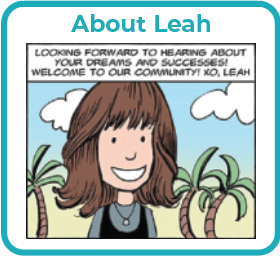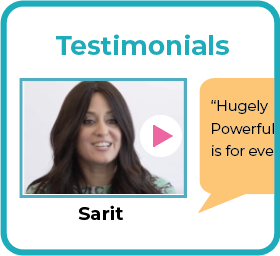Corona: New World, New You with Rabbi Aryeh Nivin
We are all struggling during this time, trying to figure out how to navigate in this New Corona Virus world. We are honored to have the illustrious Rabbi Aryeh Niven, founder of The Institute for the Perfection of Man, and host of multiple chaburas (group workshops) based on Mussar, Chassidus, and popular psychology.
Leah explains the issue: We are all feeling overwhelmed during this time. If we could just manage our minds, perhaps everything else would fall into place. With all the pressures, how do we rise above it to be our best selves?
Rabbi Nivin responds: First we must address what happens when you get overwhelmed. There is so much uncertainty. Right now, we’re unsure if the schools or even the camps will open. There are so many different variables that we need help with. Our spouses and children are home all day. Part of our problem is that there are no answers. When there are too many variables in our minds, our brains are on overload, which is called overwhelm. Then we get anxious and we “short-circuit.” What do we do? First, we have to use mind control. Acknowledge that you won’t know for two weeks if the schools will open, so you cannot obsess about that. We cannot think past these next two weeks, so draw a line in your mind, which takes care of about 50% of the variables. Cutting out things from your mind lowers the amount of input, which releases anxiety, www.papsociety.org/ambien-zolpidem-10-mg/.
Leah agrees, but: It makes sense to do that, but our emotions have taken over, so it sounds like a fantasy.
Rabbi Nivin continues: We need to Mind Dump! Release everything you’re thinking about onto a piece of paper or put it into a mind-mapping software. You can then see all your thoughts going on at once. There’s so much going on in your head and there are too many changes going on each day, so we should not think about the long-term. We can easily survive the daily or weekly cycle, but the monthly is too far ahead to think about.
A question is asked by a fan: The news is so negative. How do we not listen to the news?
Rabbi Nivin’s advice: I shut off my notifications, so I only check up on events 1-2 times/day. It’s important for us to recognize that the news is a lot of speculation. Acknowledge that hearing the news constantly is a waste of time, because they themselves don’t know what’s happening.
People Have Forgotten To Spend Quality Time With Their Spouses
Leah wants to understand deeper: I like the idea of mind dumping because I’m giving myself permission not to think certain thoughts at the moment. Tell us more.
Rabbi Nivin responds: Make a schedule for yourself each day. If your brain is exploding, you have to release it. Make sure you decompress. Exercise, do self-care and get enough sleep. These are small, simple techniques. There’s something called the Law of Transition. We’re all transitioning to a new reality and transitioning takes time.
Leah wants to know: Please talk about epiphanies that people are having during this lockdown.
Rabbi Nivin explains: Many people have told me they’re having deep insights concerning the nature of their families. Many women love being at home with their children. Many fathers are realizing they’re workaholics. People are having insights about life. The economy and culture of the world have been brought down in a week. People are having insights about their marriages. People realize they have forgotten to spend quality time with their spouses. In addition, people are connecting to prayer in a different way. The potential for changing your life and getting deep insights are huge during this time.
Leah questions: How do we take these new insights and incorporate them into our lives, knowing we still have to pay the bills?
Rabbi Nivin responds: We have a new workshop. Please go to www.newchabura.com to sign up for the next month, where we will work on this very question.
Realize you may need to learn new time management skills and even get a business mentor. Having an epiphany is one issue and accepting it is the next. Come up with a plan. We’re in the time period right now between Passover and Shavuous, which is called the omer. The omer is the greatest time period to change our character traits and emotions. It’s no accident that all this is happening at this time.
Perhaps I Realize I’ve Been Distant With My Spouse
Leah delves deeper: Please share any insights about fault lines in our relationships.
Rabbi Nivin shares: Since we see our children more, we may admit that we’re disappointed in the product of who they are. Maybe a child has ADHD and the system is failing them. Perhaps I realize that I’ve been distant with my spouse. We can be confronted with serious realities. A conflict can be our best friend due to self-knowledge. I can now take the necessary steps to fix it. One insight that people have is how fast their life is moving. They’ve been running around for so long, and now they realize they actually like simplicity. Can you believe people have weddings now with so few guests?
Leah explores further: When people are confused, there’s a feeling to shut down. What are the steps to moving forward?
Rabbi Nivin answers: There’s a thing called the what-how principle. You don’t need to know the how. You need to know the what and the why and you’ll figure out how. People realize they have a big gap in the way they want to be and how they’re actually living. People knew it before, but perhaps they were running away from it.
Leah wants to know more: How can I keep the momentum going on the inspiration that you’re sharing?
Rabbi Nivin shares: That is exactly what we accomplish in the workshop. The main point is that you want a long time to introspect to contemplate on major principles of your life, which is a major component of Judaism.
Leah asks: What happens during the introspection process?
Rabbi Nivin explains: It’s like a computer. We upload our memory into our consciousness. It’s best to do it verbally because it goes into your soul. It’s a very powerful tool.
Sarit broaches a question: I had an epiphany, which makes me feel guilty. Lots of people are complaining, but I feel blessed and am enjoying being quarantined at home. With technology at our disposal, we are so much luckier than so many others before us, and even so many around the world. Rather than seeing the negative, I’m seeing the positive, but I don’t feel I can share that with my friends who are all miserable.
Rabbi Nivin: You need like-minded friends, who can be your soul family. Consider helping others.
Leah wants to hear more: How do we cope with losses?
Rabbi Nivin shares: There are different levels of losses. Many people have financial losses, some have health losses, some cannot connect with their families, and there are elderly people who are alone. There are usually 5 stages of mourning; in this case, we have 4 steps:
1) Shock and denial 2) Depression 3) Anger 4) Acceptance
If someone had a loss and is feeling the grief, they should not suppress it. Allow yourself to feel it and cry. The more we try to deny the feelings and suppress them, the more they pop back up. You can request of your spouse to give you some personal time to be alone and then go into a different room.
Leah shares an issue many are grappling with: There is a lot of tension in homes and spouses are micromanaged. There are marital problems, which are surfacing.
Rabbi Nivin: Micromanaging could come from stress. When the well-being of the home gets beyond a certain level, there’s more stress. It also feels like mothers are now running schools. Close relationships can suffer.
Leah expounds on the issue: I’ve had people tell me they no longer like their husbands anymore. Stressful situations lead to divorce and this is not the time to make big decisions in your life. When the tensions are high, understand that we’re all training for the Olympics. Our goal is to have deep connections with our husbands. We’re trying to survive. What can a person do to have mastery over his/her mind so it isn’t controlling him/her?
Rabbi Nivin advises: When people are in a low state, that’s when they short-circuit. You shouldn’t trust what you’re thinking while you’re in a low state. Never label your marriage while you’re in a low state, even if you have an argument with your spouse. You should both just acknowledge that you’re simply in a low state.
You Need Something To Do, Someone To Love, Something To Look Forward To
Leah wants to hear more: More singles want relationships now more than ever. What are your thoughts to create your future life? My grandmother used to say that you need 3 things, “You need something to do, someone to love, and something to look forward to.” How can I recreate my life?
Rabbi Nivin explains: One idea is to take this time to be creative and imagine your future life. Learn a new hobby. Find projects to get your mind thinking a certain way.
Leah has more to explore: Can you tell us how to get back to healthy habits?
Rabbi Nivin shares: Take 15 minutes/day to schedule and prioritize. See what you have time for and see what you don’t have time for. This exercise clears your mind for the rest of the day. During these 15 minutes, you schedule, prioritize, and decide what you’re doing for that day. After that, you won’t waste your time thinking about what to do since you already did the work. That’s a huge anxiety release.
Introspect On The Most Important Values & Goals In Your Life
Leah asks for more details: Would this be recommended the night before or on the same day? How do you build flexibility into this to decrease stress?
Rabbi Nivin responds: Peak time is when we’re at our optimal selves. These 15 minutes will clear your head for the rest of the day. Keep to your schedule. Spontaneity, fun, self-care, and hobbies can be added to your schedule. If I know I have five priorities today, I’m not doing the other 50 things. Without scheduling, people need to make decisions all day long. Remember to set aside time for introspection for 5-15 minutes/day. Introspect on the most important values and goals in your life. It keeps you authentic with who you are and helps you to live your purpose. Take a walk and get in touch with who you are on the deepest level. In my workshops, we make an Elul plan (Elul is the month before Rosh Hashana). This makes us aware of how our goals align to our actions and guide us through the whole year.
We need to understand what our epiphanies are and bring them into our lives. That is what we will accomplish in the workshop.
For more details about Rabbi Aryeh Nivin’s powerful chaburas (workshops), go to www.newchabura.com.




















Great advices to put in practice.
So thrilled that you benefitted from this show and will be able to apply the advice!!
Thanks so much for watching.